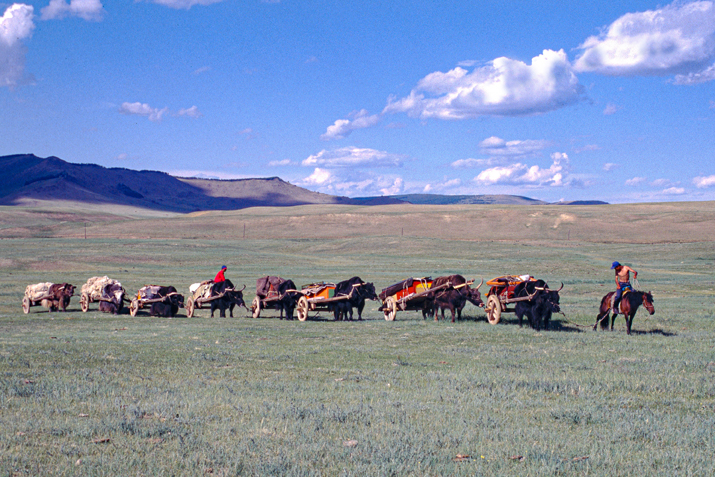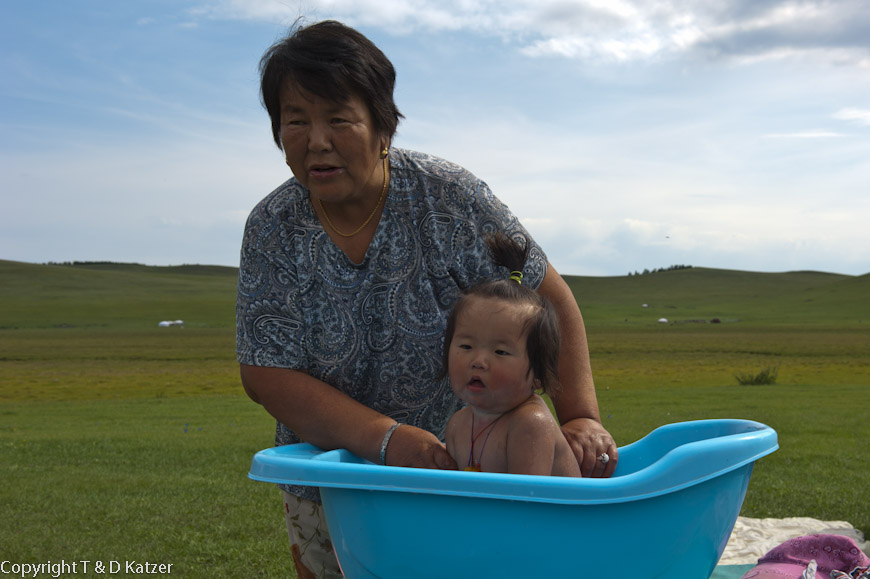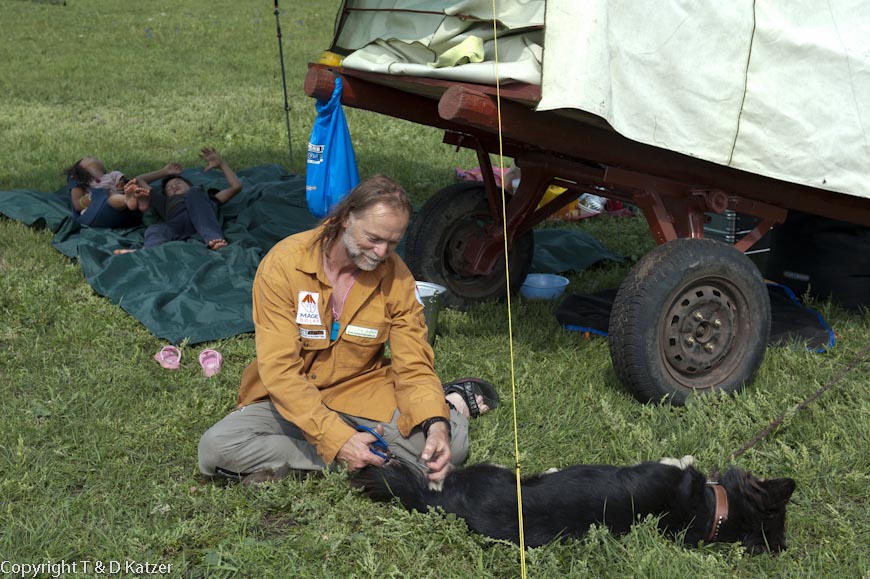
Another technical failure and storm
N 48°55'401'' E 103°39'459''
Day: 27
Sunrise:
06:04 a.m.
Sunset:
8:13 pm
Total kilometers:
452
Soil condition:
Meadow
Temperature – Day (maximum):
30 °C
Temperature – day (minimum):
17 °C
Temperature – Night:
10 °C
Latitude:
48°55’401”
Longitude:
103°39’459”
Maximum height:
1379 m above sea level



Today we are very tired and hardly able to do anything. We are very slow to get going. Tanja didn’t prepare our breakfast until 12:00. We sit down on the tarpaulin and eat some noodles cooked in spiced broth. It is served with fresh cucumber, tomatoes and then boortsog (yeast dough balls baked in oil). Bilgee Orgio’s son and his cousin Sarnai are also sitting on the tarpaulin and eating the cucumbers with great pleasure. Above all, they really like the seasoning salt from Rapunzel. Orgio can hardly control himself and would love to eat all our cucumber and salt supplies. For the two children, everything we have with us is something new. You would like to try it out. “Can we go into the tent?” they ask politely. “If you take your shoes off, I’d love to,” Tanja replies. Then I try to get some sleep and make myself comfortable under a tarpaulin that provides shade. As soon as I lie down, a strong wind comes up and destroys my rest. You can’t rely on the weather in Mongolia. It changes constantly, sometimes even from one minute to the next. We use the afternoon to wash ourselves in the stream. The water is ice cold. It reminds us of Lake Baikal, where we lived for a few weeks on our cycling trip from Germany to Mongolia. The good thing about the Baikal, however, was that you could jump in, get a brief shock, but then at least your whole body was submerged in the water. According to the motto, an end with horror is better than horror without end. On this stretch of water, however, the washing is more like a horror without end. We can only wet our bodies with a cup. Every time we empty the container above us, we are left breathless. It’s a bit like inflicting pain on yourself. “Washing under extreme conditions!” I shout. Although we have the first pseudo shower here for over two weeks, we definitely can’t enjoy it.
Even in the late afternoon, I’m hardly able to do anything. Nevertheless, so much has happened in the last ten days that I feel compelled to write it down. “If I don’t start now, I’ll never manage to record our experiences again,” I say and grab my energy box and the car battery to connect both to the solar panels. “You can set up your equipment in the small yurt. It’s much better in this changeable weather,” says Tovuu, Bilgee’s brother-in-law, who lives with his wife Baatar in the small yurt next to Bilgee’s yurt during the summer vacations and moves into his city apartment in Erdenet in winter. I thank him and move my writing desk to his accommodation. After I have carried everything inside, I tie the solar panels to the yurt roof, lead the cables inside through the door and connect my 12 to 220 volt converter to the car battery. Although the part cost 160,000 Tugrik (92,- €) I am now happy to have bought it with Taagii still in U. B. because functioning technology is of fundamental importance for my documentation work out here. Unfortunately, the functionality of high-tech in the bush sometimes hangs by a thread. The smallest detail can ruin everything. I’ve already experienced this in the U.B. when my energy box converter gave an alarm after just ten minutes due to overheating. But with the new converter, this is now history. I can use it to charge my laptop without any problems. It doesn’t matter that the 12-volt power supply ordered from Germany has not yet arrived at Naraa’s address. In a good mood, I settle into my camp chair, which I have pimped up with a felt mat and a few inflatable seat cushions so that I can sit in it for eight hours a day without having bent my back at the end of the day. I’m writing the first few sentences when suddenly the laptop’s touch pad reacts hypersensitively. It is impossible to operate it. I nervously switch the Durabook on and off again, but it remains more or less unable to maneuver. A wave of fear and despair rises in me. Once again I have a technical problem. I take a look at the converter and lo and behold, it has failed. The red indicator light shows an error. I connect it to the battery several times, but it stays connected. He no longer makes sugar. Then I plug the laptop’s power supply into the power box and lo and behold the touch pad works again. Apparently the defective new converter has caused an overvoltage or undervoltage and thus put the laptop out of action. “Problem solved,” I whisper. During further checks of the converter, I have to face the fact that it only worked for a few minutes before the expensive part gave up the ghost. Even after disassembling and reassembling, the 12 volt output is dead. The last option for a permanent power supply for the notebook is to try the 12 volt power supply of our Itronix replacement computer. As it supplies more power than the Durabook needs, there is a risk of killing it in the long term. I take the risk and connect it anyway. The green charging lamp on the notebook actually indicates a power supply.
Suddenly, a strong gust of wind blows through the open yurt door. It stirs up the dust and dirt that immediately settles on the technology. I rush outside to take a look at the sky. Threatening dark clouds have piled up. Driven by the wind, they chase towards our camp at high speed. Lightning flashes through the dark sky formations, making you feel scared and anxious. I rushed to the tents to pull the storm tensions with Tanja. Then we jump to the recently opened sun canopy. We dismantle it in no time at all, fold it up and throw it onto the horse-drawn cart. “We have to put the tarpaulin over the equipment and the food!” shouts Tanja, trying to beat the howling wind. We have difficulty fastening the tarpaulin as the gusts almost tear it out of our hands. “You take care of covering the equipment, I have to make the yurt rainproof!” I shout and rush back to the nomadic dwelling. Because Baatar and her husband Tovuu have already driven to Erdenet in their car this afternoon and Bilgee and Ulzii are on their way with the horses to buy a goat for the expedition’s food supply, we are alone in the camp. Only little Orgio is there and watches our excited goings-on attentively. As he knows the weather in this country, he put on a raincoat before the storm hit us. I, on the other hand, am soaked to the skin and shaking like a leaf. When I arrive at the yurt, I notice that the door has been slammed shut by the wind. Unfortunately, I pulled the cable for the solar panels through this door. “Oh no! Please don’t!” I shout as I realize that one of the cables is badly crushed. “Perhaps it is my destiny not to write any reports on this trip?” I think seriously, because never before in my expedition and travel life have I had such extensive and great difficulties with the technology. However, at this moment I have no time to think about such things, because in the meantime the rain is pouring down in torrents into the yurt. The laptop and the power box are wet in seconds. “Bloody hell!” I curse loudly, close the energy box Gedatt built and pack the laptop into a waterproof Ortlieb bag. Then I rush back outside to look for the rope that can be used to close off the dome-shaped wooden roof crown, which is used as a smoke outlet. I undo the knot in a flash, throw the rope over the impermeable, water-repellent felt strips of the roof made of sheep’s wool and close the flue. Now the tinny chimney is in the way. I pull the rusty part out of the small oven and can close the roof hatch completely. Orgio, Tanja and I are now standing in the small dwelling like watered poodles, waiting for the thunderstorm to end. “Has anything been damaged?” asks Tanja quietly, pointing to the laptop bag and energy box. “I think it caught a cable from the solar panel. I won’t know how the laptop and the power box are doing until later. They both got wet when we covered the horse and cart,” I say meekly, shivering from the cold and wet. “Take my fleece jacket,” Tanja offers me. “Then you’re freezing. That doesn’t make any sense.” “I’ve got a rain jacket over it and I’m dry. You’d better put it on or you’ll catch a cold,” she says emphatically, whereupon I take off my wet shirt to squeeze into the too-small jacket. “Phew, much better. Thank you,” I groan, rubbing my damp hands dry.
An hour later, Bilgee and Ulzii come back. “Do you have a goat?” asks Tanja. “Today is a bad day to buy a goat. They don’t want to give us the goat until tomorrow, otherwise it will be bad luck,” says Ulzii. The experienced nomad Bilgee quickly lights a fire in the two yurts. Due to the thick felt walls, it gets so warm in the dwelling so quickly that we immediately take off our jackets. We quickly learn how to live out here and how to arm ourselves against these weather changes. As soon as my body is warm again, I take care of the technology. Thank goodness the laptop and power box survived the rain attack. Only the cable looks bad because the connection is crushed. After half an hour, I bent the thing back into shape so that I could use it without any problems.
“Food’s coming! Bilgee has cooked a nice-smelling soup!” Tanja calls me. I interrupt my work and go with Tanja to Bilgee’s big yurt. It smells of cooked goat meat, potatoes and onions. “Mmm, tastes delicious,” we praise our companion, who not only knows a lot about horses and life out here, but is also a good cook. At ten o’clock we retire to the tent. As my watch today runs from 4:00 a.m. to 6:00 a.m., I’m lucky enough to be able to sleep for 6 hours straight.
We look forward to your comments!

